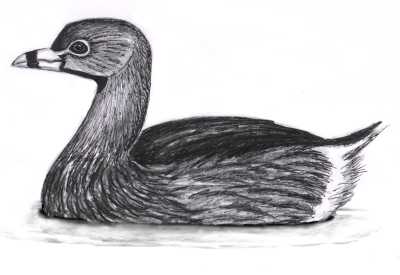
Dear Bird Folks,
There is a little brown bird that has been swimming and diving in a small pond in front of my house. it looks like something called a “grebe.” Do we have grebes around here. How can I keep it around?
Colleen, Sandwich
Sure, Colleen,
We have grebes around here. Grebes have just returned to Cape Cod after being gone for the summer. By the way, grebe is pronounced “greeb,” not “greebee,” “greb” or “Greg.” The kind of grebe that you are seeing is called a pied-billed grebe. Although we see other grebes around here, pied-billed grebes are the grebes most often found in small freshwater ponds, like yours. This grebe gets the name “pied-billed,” not from its favorite snack food, but from the black ring the bird’s beak has during the breeding season.
Grebes are another one of those interesting Cape birds that most people know very little about. Well, that’s all about to change thanks to you, Colleen, and your grebe-spotting eye. Many people would call your bird a duck and be done with it. However, grebes are not ducks and in many ways they are more unusual than ducks.
Unlike ducks, grebes have “lobed” toes, not webbed feet. A grebe’s foot has three long toes that look like they have been smashed flat with a hammer or stepped on by Rush Limbaugh. Instead of one big web, a grebe has three little paddles on each foot. This odd design makes grebes masterful in water, while allowing them to move around through thick aquatic vegetation. Grebes are rarely seen on land, in fact, they don’t even nest on land. They make their nests right in the water, building them out of floating vegetation.
One of the reasons that many people overlooked pied-billed grebes is that they can seemingly vanish without a trace. Pied-bills have the ability to squeeze the air out of their feathers and slowly sink underwater without leaving so much as a ripple in the water. Once underwater, grebes can swim great distances to the safety of the weeds. Or they can stay just below the surface with only their eyes or nostrils breaking the water surface. Because of their ability to literally disappear from danger, old hunters used to call pied-billed grebes “hell divers.” Since disappearing birds were never seen again, it was thought that they must have gone straight down to hell. Hell? Man, those early hunters were a bit judgmental, don’t you think?
Having such tremendous swimming skills has a downside. Grebes can hardly walk at all on land. Sometimes a grebe will be fooled into landing on a wet parking lot, thinking that it is a pond or lake. When that happens, Mr. Grebe is in big trouble, for he cannot take off from land and cannot walk around to find water. So unless he can flag down a cab, he’ll be in for a rough day. The reason a bird can be fooled by a wet parking lot is that grebes rarely fly during the light of day. They migrate under the cover of darkness. Even when confronted with danger, grebes prefer to dive and swim, instead of flying to escape.
As for what you can do to keep your grebe around, grebes eat mostly fish and other aquatic creatures, including leeches. Unless you have an extra leech in your kitchen, and no, I’m not talking about your brother-in-law, there isn’t a whole lot you can do.
Enjoy your pied-billed grebe, Colleen. Hopefully it will stay until winter’s ice forces it to move on. Keep an eye on it, perhaps you’ll see it fly. Like many people, I have yet to see a grebe fly. If you think that it’s about to fly, call me and I’ll be right over. You put the coffee on, I’ll bring the leeches.